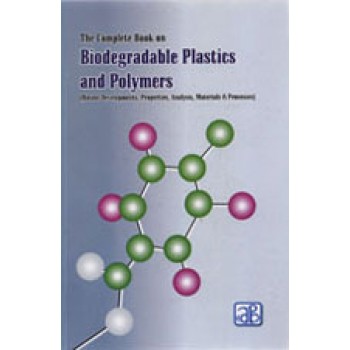The Complete Book on Biodegradable Plastics and Polymers (Recent Developments, Properties, Analysis, Materials & Processes)
| Price: | Rs.1,275.00 |
Detail Of The Complete Book on Biodegradable Plastics and Polymers (Recent Developments, Properties, Analysis, Materials & Processes)
| ISBN | 8178330350 |
| Pages | 672 |
| Language: | English |
| Product Code: | 1 |
| Size(in cm): | 21*13.5 cm |
| Weight(in grams): | 500(approx) |
Description:
Biodegradable plastics made with plant based materials have been available for many years. The term biodegradable means that a substance is able to be broken down into simpler substances by the activities of living organisms, and therefore is unlikely to persist in the environment. There are many different standards used to measure biodegradability, with each country having its own. The requirements range from 90 per cent to 60 per cent decomposition of the product within 60 to 180 days of being placed in a standard composting environment. They may be composed of either bio plastics, which are plastics whose components are derived from renewable raw materials, or petroleum based plastics which contain additives. Biodegradability of plastics is dependent on the chemical structure of the material and on constitution of the final product, not just on the raw materials used for its production. Polyesters play a predominant role as biodegradable plastics due to their potentially hydrolysable ester bonds. Bio based polymers are divided into three categories based on their origin and production; polymer directly extracted from biomass, polymers produced by classical chemical synthesis using renewable biomass monomer and polymers produces by microorganisms or genetically modified bacteria. In response to public concern about the effects of plastics on the environment and in particular the damaging effects of sea litter on animals and birds, legislation is being enacted or is pending in many countries to ban non degradable packing, finishing nets etc.
This book basically deals with biodegradable plastics developments and environmental impacts, hydro biodegradable and photo biodegradable, starch synthetic aliphatic polyester blends, difference between standards for biodegradation, polybutylene succinate (pbs) and polybutylene, recent developments in the biopolymer industry, recent advances in synthesis of biopolymers by traditional methodologies, polymers, environmentally degradable synthetic biodegradable polymers as medical devices, polymers produced from classical chemical synthesis from bio based monomers, potential bio based packaging materials, conventional packaging materials, environmental impact of bio based materials: biodegradability and compostability, etc.
Environmentally acceptable degradable polymers have been defined as polymers that degrade in the environment by several mechanisms and culminate in complete biodegradation so that no residue remains in the environment. The present book gives thorough information to biodegradable plastic and polymers. This is an excellent book for scientists engineers, students and industrial researchers in the field of bio based materials.
Reviews (0)
Write a review
Your Name:Your Review:
Note: HTML is not translated!
Rating: Bad Good
Enter the code in the box below:



 |
| 